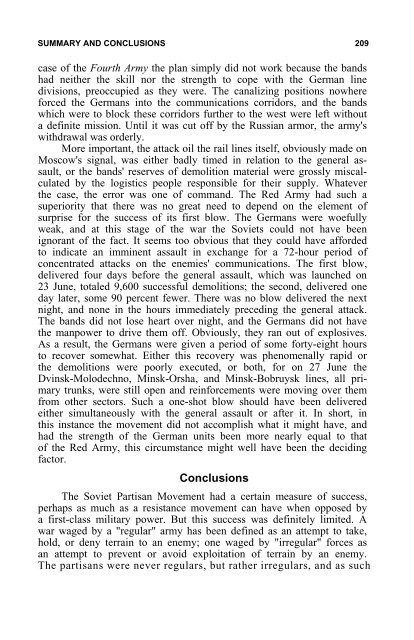the soviet partisan movement 1941-1944 by edgar m. howell
the soviet partisan movement 1941-1944 by edgar m. howell
the soviet partisan movement 1941-1944 by edgar m. howell
Create successful ePaper yourself
Turn your PDF publications into a flip-book with our unique Google optimized e-Paper software.
SUMMARY AND CONCLUSIONS 209<br />
case of <strong>the</strong> Fourth Army <strong>the</strong> plan simply did not work because <strong>the</strong> bands<br />
had nei<strong>the</strong>r <strong>the</strong> skill nor <strong>the</strong> strength to cope with <strong>the</strong> German line<br />
divisions, preoccupied as <strong>the</strong>y were. The canalizing positions nowhere<br />
forced <strong>the</strong> Germans into <strong>the</strong> communications corridors, and <strong>the</strong> bands<br />
which were to block <strong>the</strong>se corridors fur<strong>the</strong>r to <strong>the</strong> west were left without<br />
a definite mission. Until it was cut off <strong>by</strong> <strong>the</strong> Russian armor, <strong>the</strong> army's<br />
withdrawal was orderly.<br />
More important, <strong>the</strong> attack oil <strong>the</strong> rail lines itself, obviously made on<br />
Moscow's signal, was ei<strong>the</strong>r badly timed in relation to <strong>the</strong> general assault,<br />
or <strong>the</strong> bands' reserves of demolition material were grossly miscalculated<br />
<strong>by</strong> <strong>the</strong> logistics people responsible for <strong>the</strong>ir supply. Whatever<br />
<strong>the</strong> case, <strong>the</strong> error was one of command. The Red Army had such a<br />
superiority that <strong>the</strong>re was no great need to depend on <strong>the</strong> element of<br />
surprise for <strong>the</strong> success of its first blow. The Germans were woefully<br />
weak, and at this stage of <strong>the</strong> war <strong>the</strong> Soviets could not have been<br />
ignorant of <strong>the</strong> fact. It seems too obvious that <strong>the</strong>y could have afforded<br />
to indicate an imminent assault in exchange for a 72-hour period of<br />
concentrated attacks on <strong>the</strong> enemies' communications. The first blow,<br />
delivered four days before <strong>the</strong> general assault, which was launched on<br />
23 June, totaled 9,600 successful demolitions; <strong>the</strong> second, delivered one<br />
day later, some 90 percent fewer. There was no blow delivered <strong>the</strong> next<br />
night, and none in <strong>the</strong> hours immediately preceding <strong>the</strong> general attack.<br />
The bands did not lose heart over night, and <strong>the</strong> Germans did not have<br />
<strong>the</strong> manpower to drive <strong>the</strong>m off. Obviously, <strong>the</strong>y ran out of explosives.<br />
As a result, <strong>the</strong> Germans were given a period of some forty-eight hours<br />
to recover somewhat. Ei<strong>the</strong>r this recovery was phenomenally rapid or<br />
<strong>the</strong> demolitions were poorly executed, or both, for on 27 June <strong>the</strong><br />
Dvinsk-Molodechno, Minsk-Orsha, and Minsk-Bobruysk lines, all primary<br />
trunks, were still open and reinforcements were moving over <strong>the</strong>m<br />
from o<strong>the</strong>r sectors. Such a one-shot blow should have been delivered<br />
ei<strong>the</strong>r simultaneously with <strong>the</strong> general assault or after it. In short, in<br />
this instance <strong>the</strong> <strong>movement</strong> did not accomplish what it might have, and<br />
had <strong>the</strong> strength of <strong>the</strong> German units been more nearly equal to that<br />
of <strong>the</strong> Red Army, this circumstance might well have been <strong>the</strong> deciding<br />
factor.<br />
Conclusions<br />
The Soviet Partisan Movement had a certain measure of success,<br />
perhaps as much as a resistance <strong>movement</strong> can have when opposed <strong>by</strong><br />
a first-class military power. But this success was definitely limited. A<br />
war waged <strong>by</strong> a "regular" army has been defined as an attempt to take,<br />
hold, or deny terrain to an enemy; one waged <strong>by</strong> "irregular" forces as<br />
an attempt to prevent or avoid exploitation of terrain <strong>by</strong> an enemy.<br />
The <strong>partisan</strong>s were never regulars, but ra<strong>the</strong>r irregulars, and as such
















